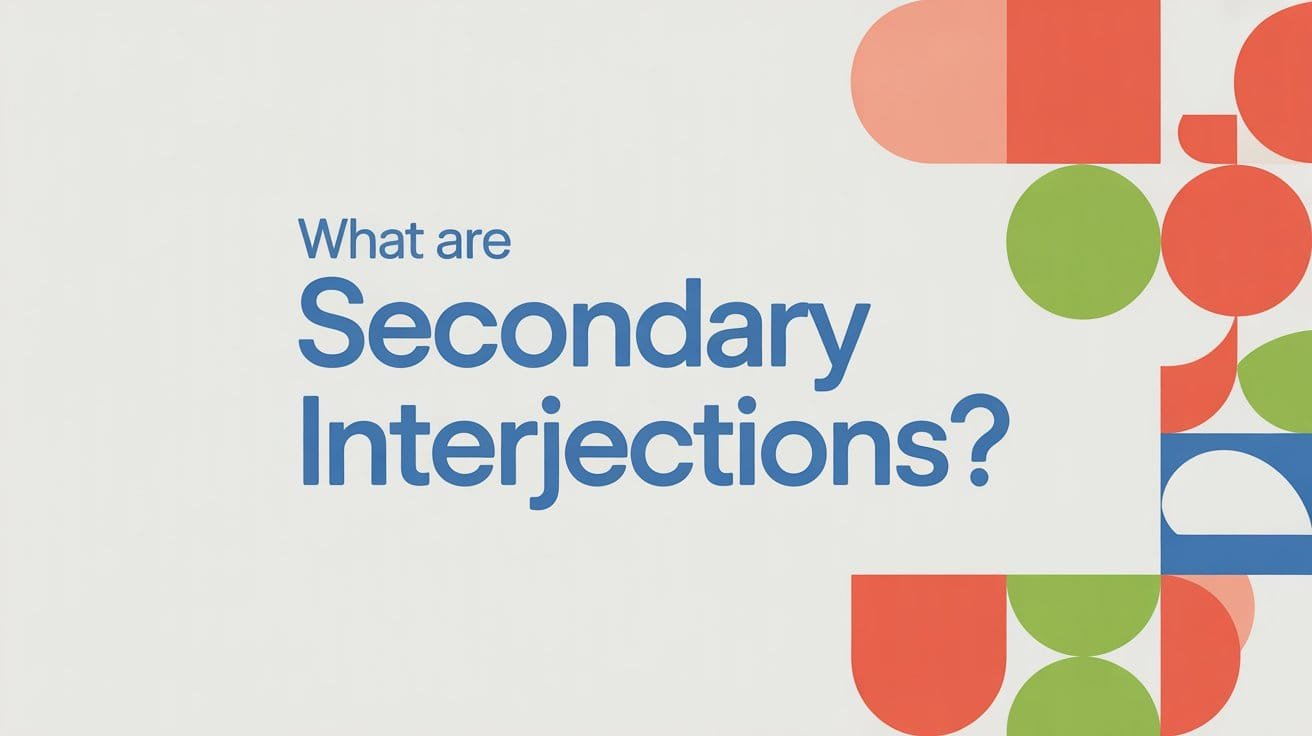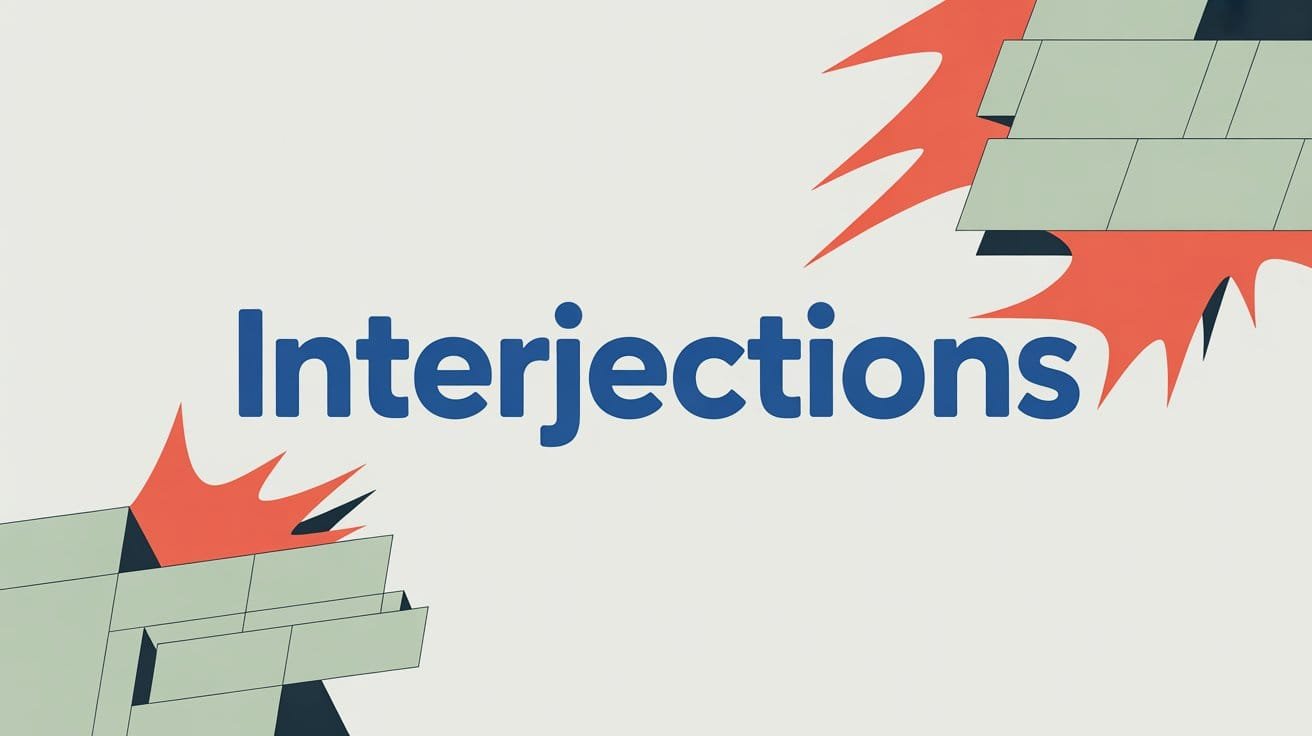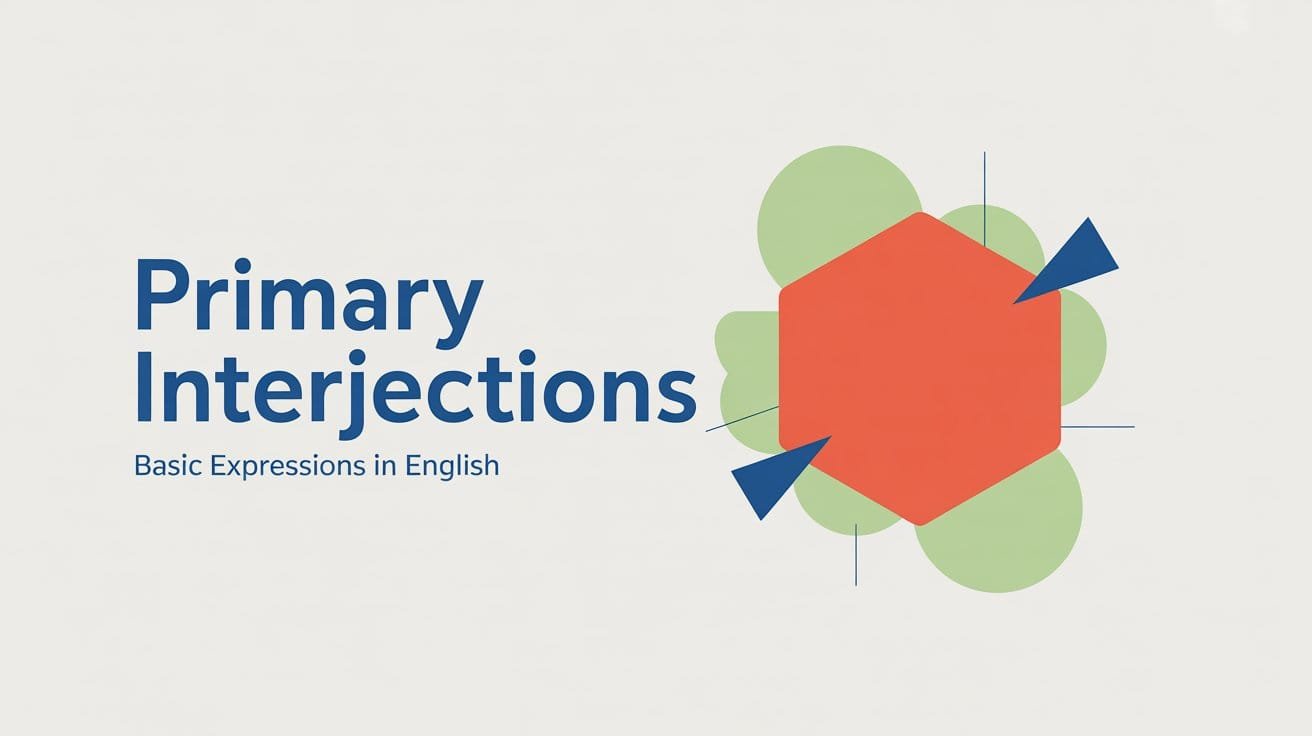Did you know there’s a way to express emotions indirectly using complete phrases or sentences? These expressions, known as secondary interjections, go beyond the basic “Ouch!” or “Wow!” to convey emotions. Secondary interjections are formed using existing words or phrases repurposed to express emotion.
For instance, Exclaiming “Good heavens!” when surprised or “For goodness’ sake!” when frustrated are examples of secondary interjections. These expressions add color and personality to conversations and are deeply embedded in casual and formal communication.
What Are Secondary Interjections?
Secondary interjections are words or phrases borrowed from other parts of speech, such as nouns, verbs, or adjectives, and used to express emotions, reactions, or attitudes. Unlike primary instinctive and standalone interjections, secondary interjections carry additional meaning tied to their original usage in the language.
For example, words like “Goodness!”, “Heavens!”, or “Fantastic!” are often repurposed as interjections to convey surprise, excitement, or other emotional reactions. They’re not just sounds; they’re meaningful words used in a context that adds emotional weight to a conversation or writing.
Examples of Secondary Interjections
Here are some examples of secondary interjections commonly used in English:
- Goodness! – Expresses surprise or shock.
- “Goodness! I didn’t see that coming!”
- Heavens! – Shows astonishment or dismay.
- “Heavens! How did you manage that?”
- Fantastic! – Conveys excitement or approval.
- “Fantastic! You’ve done an amazing job!”
- Indeed! – Used to confirm or emphasize agreement.
- “Indeed! That’s exactly what I was thinking.”
- Bravo! – Expresses praise or encouragement.
- “Bravo! That was an excellent performance!”
Why Are They Called “Secondary”?
These interjections are termed “secondary” because they originate from words that fulfill other grammatical roles in sentences. Their primary function is not to serve as interjections; however, through use, they acquire the ability to convey emotions. This adaptability makes them secondary but no less effective in expressing emotion, often adding a layer of sophistication or humor that purely instinctual sounds cannot.
How Are Secondary Interjections Different from Primary Interjections?
Both primary and secondary interjections express emotions but differ in complexity, context, and usage.
While primary interjections are short and spontaneous, secondary interjections are often more reflective and involve a broader range of emotions.
Key Differences:
- Primary Interjections are often used in situations that require quick, gut-level reactions. For instance, if you accidentally touch something hot, you might immediately say “Ow!” without thinking much about it.
- Secondary Interjections, on the other hand, tend to be used in more reflective situations. For example, after hearing surprising news, you might say “Goodness!” to express astonishment but more thoughtfully or deliberately.
Here’s a table to help explain the differences:
| Aspect | Primary Interjections | Secondary Interjections |
| Emotion | Express immediate and basic emotions (pain, surprise, joy) | Express more complex emotions (shock, approval, disbelief, relief) |
| Complexity | Simple, one-word reactions | More complex, often longer or made up of multiple words |
| Examples | “Ouch!”, “Wow!”, “Oops!” | “Goodness!”, “Bravo!”, “Oh dear!” |
| Usage Context | Informal, spontaneous reactions in everyday situations | Can be used in both informal and formal contexts |
| Timing | Often occur instantly, without much thought | Can involve a bit more reflection or can be used deliberately |
| Tone | Short and punchy | Can be more expressive and emphatic, sometimes used to emphasize or elaborate |
| Role in Conversation | Typically standalone and used to react to something quickly | Can be part of a sentence or used to emphasize a particular point |
Secondary Interjections in Everyday Conversations
Secondary interjections can be used in various situations to express a range of emotions. Below are examples of how they can be used in everyday conversations:
Expressing Surprise or Shock
Secondary interjections can convey surprise or shock, but unlike primary interjections, they often follow a moment of reflection.
For instance, when you hear unexpected news, such as a close friend moving away, you might exclaim,
“Oh my goodness! I can’t believe it!”
This reaction shows surprise, but also an element of disbelief and thoughtfulness. Similarly, “Well, I never! That’s quite a twist,” expressing shock and a bit of reflection on the unexpected news.
Showing Disapproval or Disgust
Secondary interjections are often used to express disapproval or disgust in response to something unpleasant or uncomfortable. These interjections reflect a more deliberate judgment.
For example, if you witness someone behaving rudely in public, you might say,
“Oh dear, that’s just unacceptable.”
It conveys your disapproval. You could also express disgust by saying, “Ugh, that’s really gross,” as a reaction to something unpleasant, such as bad food or a messy situation.
Expressing Relief or Comfort
Secondary interjections can express relief or comfort after moments of tension or stress. These interjections are often used to release emotional tension, and they can help to communicate a sense of ease or comfort after a stressful situation.
For example, after completing a challenging task, like taking a difficult exam, you might let out a sigh of relief and say,
“Thank goodness it’s over!”
This shows that the moment of stress has passed, and you’re now at ease. Another example could be, “Phew, that was close!” to show relief after narrowly avoiding a stressful situation.
Showing Approval or Praise
Secondary interjections can be used to express approval or praise. These interjections show positive emotion and allow speakers to acknowledge success, good work, or impressive achievements.
For instance, if a friend shares news about a successful project, you might say,
“Bravo! That’s fantastic work!”
This interjection conveys your approval and admiration in a more thoughtful way. Another example would be, “Well done! You nailed it,” expressing sincere praise for someone’s accomplishment.
Expressing Sympathy or Empathy
Finally, secondary interjections are often used to express sympathy or empathy when someone is going through a difficult time. These interjections show understanding, care, and emotional support.
For example, if a friend tells you about a personal challenge they are facing, you might say,
“Oh, I’m so sorry to hear that.”
This expression of sympathy shows that you are emotionally present and understanding of their situation. Alternatively, you might say, “How awful! I can’t imagine how hard that must be,” conveying a deeper level of empathy for their pain or struggle.
List of Common Secondary Interjections in English
| Secondary Interjections in English | |||
| Alas | Ding-dong | Holy moly | Really |
| Ah | Drat | Holy Smoke | Right |
| Aha | Eek | Hoorah | Rubbish |
| All hail | Eh | Hooray | Shoot |
| All right | Eureka | How wonderful | Shucks |
| Amazing | Fabulous | I see | Stop |
| Attaboy | Fair enough | Imagine | Sure |
| Attagirl | Fantastic | Incredible | Sure thing |
| Awesome | Fiddlesticks | Indeed | Sweet |
| Bad luck | For goodness’ sake | Is that so? | Ta-da |
| Balderdash | For pity’s sake | Keep it up | Terrific |
| Beautiful | Gadzooks | Kudos | Think fast |
| Behold | Gee | Legit | Too bad |
| Bingo | Get out | Look | Ugh |
| Bless you | Go on | Marvelous | Unbelievable |
| Bravo | Golly | My goodness | Wait |
| Bravo zulu | Good grief | My stars | Well |
| Bummer | Good heavens | My word | Well done |
| By golly | Goodness | Oh | What |
| By gosh | Gosh | Oh dear | Whoa |
| Cheers | Great Scott | Oh my | Wicked |
| Come on | Heads up | Oh well | Wow |
| Crikey | Heavens | OMG | Yes |
| Dear me | Hmm | Please | Yikes |
| Ding | Holy cow | Quick | You don’t say |



